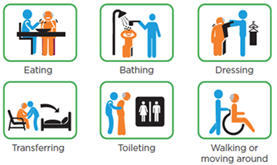Working in the nursing home environment during Covid-19
By Olivia Divilly – Occupational Therapist, HealthcareDirect
The COVID-19 pandemic is having a profound impact on the lives, health and wellbeing of individuals, families and communities worldwide. Each of our roles within the healthcare system have changed and expanded during this pandemic as we continue to learn and adapt. This is my experience of working as an Occupational Therapist in nursing homes during Covid-19.
New Roles: Within the nursing home environment each patient is experiencing disruption to their occupations because of the various impacts of the COVID-19 pandemic. Almost every occupation within the nursing home environment has been impacted. Family and friends visiting is a distant memory, community outings for most residents are no longer an option and once loved music sessions, weekly mass and therapy classes in the dayroom are now on hold. As an Occupational Therapist my role includes facilitating residents to engage in new meaningful occupations. Despite all of the challenges almost every occupation is still possible with a little bit of creativity. Regular zoom calls and window and garden visits allow families stay as close as ever and adapting meaningful tasks allow residents to continue to engage in desired occupations.
Community Spirit: The community spirit in nursing homes is something that I have really enjoyed being a part of. All residents, multi-disciplinary team members and family are all working towards the one goal despite the challenging circumstances. This shared goal can help build a closer relationship between both staff and residents as we all share the same hopes and concerns.
Challenges: Like everyone there has been some challenges to working in a nursing home environment. Initially the fear of the unknown was the emotion I experienced the most frequent. I was nervous about working under the new restrictions as it was something I had never experienced before. I was unsure how the virus would impact my practice and if personal protective equipment would make communicating with residents more difficult. I used recourses such as supervision with my manager, reviewing current literature and peer discussion to increase my knowledge and this in turn helped me to become more confident.
New Learning: This pandemic has provided me with lots of new learning opportunities I would not have had the chance to experience otherwise. Prior to Covid-19, my role involved visiting numerous nursing homes weekly. Since the start of the pandemic I have started completing remote sessions via video call with the assistance of nursing staff and care assistants. This has been an effective way to review and assess patients who otherwise may not have access to Occupational Therapy for a couple of months. I have had the opportunity to increase my knowledge regarding infection control measures and I have for the first time worn personal protective equipment. I have completed online courses to refresh my knowledge on hand hygiene and infection control to help increase my confidence when practicing in nursing home environments and this knowledge will translate into my future practice.
Communication: Communication is always an integral part of working in healthcare, however, during the Covid-19 pandemic the importance of effective communication is more important than ever before. Communicating my concerns, observations and queries ensured that I could complete my work to the best of my ability while also protecting my colleagues and the residents in nursing homes.
Working in nursing homes during Covid-19 has been a different experience. It has been both challenging and rewarding and most certainly something that will impact on my practice for years to come.

